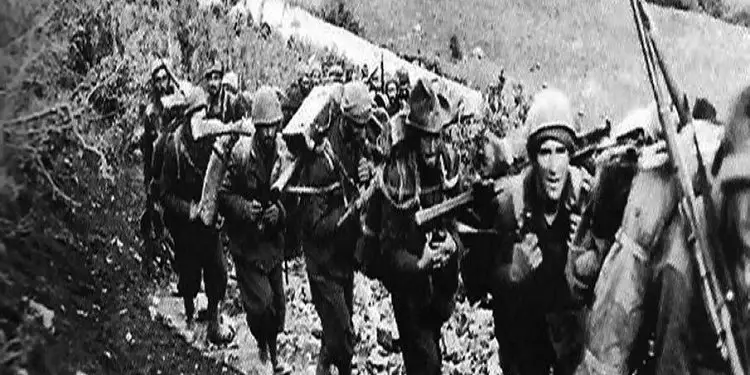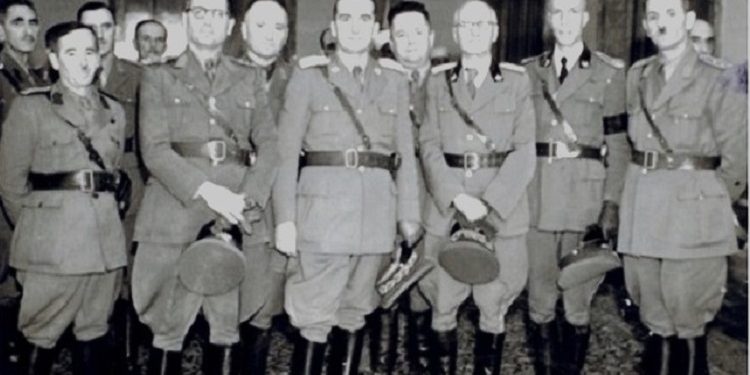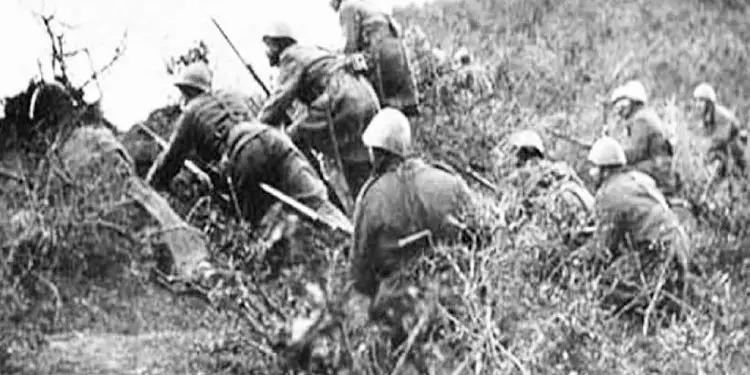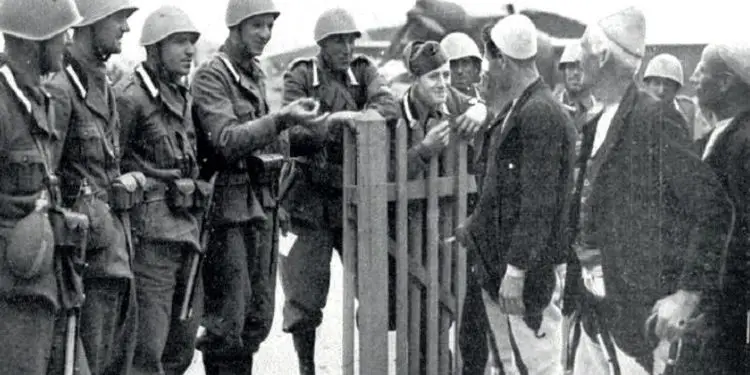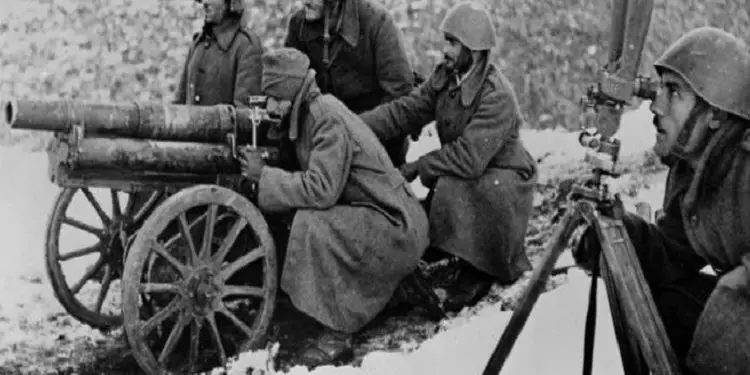Part One
Memorie.al / The War Diaries of the Supreme Command of the German Armed Forces (Kriegstagebuch des Oberkommandos der Wehrmacht, KTB OKW), in the years 1940-1945, were kept by the National Defense Office at the Operations Headquarters of the German Armed Forces (Abteilung Landesverteidigung im Wehrmachtführungsstabamt). These war diaries describe strategies, battles, troop movements, front lines, objectives, operational decisions and war plans and assessments of combat situations, by the highest leadership of the German military forces. The Secretary of the War Diaries at the Supreme Command of the German Armed Forces was Helmuth Greiner until March 1943 and then Percy Ernst Schramm. In the years 1961-1965 the war diaries were compiled by historians and published by the publishing house Bernard & Graefe Verlag für Wehrëesen, Frankfurt am Main. The main historian was Percy Ernst Schramm and his assistant historians, respectively by volume, were as follows:
Hans-Adolf Jacobsen: Volume I, 1517 pages, period 01.08.1940 – 31.12.1941, published in 1965.
Andreas Fritz Hillgruber: Volume II, 1-2, 1477 pages, period 01.01 – 31.12.1942, published in 1963.
Walther Hubatsch: Volume III, 1-2, 1673 pages, period 01.01 – 31.12.1943, published in 1963.
Percy Ernst Schramm: Volume IV, 1-2, 1976 pages, period 01.01.1944 – 22.05.1945, published in 1961.
These war diaries, compiled in four volumes (originally in eight volumes), are still today one of the most important factual sources for the science of history, covering World War II. In order, only the parts where it was written about Albania will be presented, translated into Albanian, according to the published volumes.
Volume I
August 1, 1940 – December 31, 1941
A Introduction
III. The Plan and Aims of the War 1939-1941: A Summary, page 71 E. In the Balkan War (April 1941), Hitler had fewer territorial aims, much more aimed at securing strategic and economic interests. In no way did he want to allow the British to settle in Greece, as well as the threat to the oil fields in Romania, which were very important for his war. He also thought that in that way he would help Italy to maintain its positions in Albania.
B War Diary
Page 42 – 21.08.1940. The Adriatic Sea should be entirely under Italian rule; the sphere of influence in the Balkans should be expanded. For this, it is thought that Yugoslavia should be broken up, an independent Croatia should be created, but under the influence of Italy, Albania should be enlarged, taking the areas inhabited by Albanians in the south of Yugoslavia and in Greece, as well as uniting with Corfu and perhaps with some other islands, in the Ionian Sea.
Page 81 – 18.09.1940. According to the reports of the Italian General Staff of the ground forces, given to the military attaché in Rome, the 49th and 51st Divisions have been sent to Albania; the 29th Division will also be sent by 30.09.1940.
Page 110 – 05.10.1940. According to a report dated 24.09.1940, (171/40 Top Secret), of the military attaché in Rome, the Italian army now consists of 74 divisions, of which 51 are located in the homeland, 8 in Albania, 14 in Libya and 1 in the Dodecanese Islands.
Page 130 – 28.10.1940. The Foreign Section announces that, after a note was delivered to the Greek government by the Italian envoy in Athens at 03:00, today at 06:00 in the morning; Italian troops have entered Greece from Albania.
Page 138 – 30.10.1940. The political action planned for the beginning of September was not undertaken, but during this month the Italian XXVI Corps, located in Albania, was reinforced with 3 Divisions. On 27.10.1940, at 21:00, Count Ciano officially notified the German responsible person, the nobleman Bismarck that the following day, at 03:00, the ultimatum for the occupation of strategic points would be delivered to the Greek government and at 06:00, the entry of Italian troops from Albania into northern Greece would begin.
The aim of this operation is the conquest of Corfu, the penetration from Ioannina to the Gulf of Patras, to conquer the islands of Levkas, Cephalonia and Zante, as well as the march to Athens and Thessaloniki. The leadership is in the hands of the general of the XXVIth Corps, Visconti Prasca.
Since 2 of the 9 divisions located in Albania are needed to protect the border with Yugoslavia, it is thought that the Italian superiority is not so great and in the case of a large Greek resistance, a quick success should not be counted on. Due to the bad weather conditions, the Italian aircraft stationed in Albania cannot enter.
Page 157 – 07.11.1940. From the Italian aviation forces, starting from Albania, 56 fighter aircraft, 120 fighter aircraft and 17 reconnaissance aircraft were used in Greece.
Page 159 – 08.11.1940. Foreign news: news from General Von Rintelen, according to which reinforcements are being sent to Albania (4 Italian divisions).
Page 162 – 09.11.1940. Due to the difficult transport conditions in Albania, it will be a long time before the reinforcements reach the front. A quick success for the Italians can no longer be counted on. They are trying to fix what they had not prepared in advance.
Page 163 – 09.11.1940. The advantage of the occupation of northern Greece has several negative sides. By bringing another country into the war, the war was expanded and spread to the Balkans, something that Germany has tried to avoid, until today. The Italian army is thus tied up in one more direction. The British thus have one more ally and one more land support point, which strengthens their position in the eastern part of the Mediterranean Sea. Their possibilities of action against the Italian armies in Libya and Albania have increased.
Page 172 – 13.11.1940. The military attaché in Rome sends information given to him by the chief of staff at the Italian Ministry of Defense, Colonel Sorice, regarding the situation in Albania.
Page 182 – 19.11.1940. The situation in Albania: complicated.
Page 183 – 20.11.1940. According to a telegram dated 18.11.1940, from the military attaché in Rome, the Italian general staff judges the situation in the Albanian-Greek area, after the withdrawals in some parts of the front and the sending of reinforcements, to be stable. The situation, however, has worsened because the Albanian battalion has gone over to the Greek side. General Marras was yesterday at the German Chancellery and requested 3000 trucks to be transported to Albania from Yugoslavia in exchange for 3000 Italian trucks.
Page 188 – 25.11.1940. Negotiations with the Italians regarding trucks to Albania have reached a certain conclusion.
Page 201_202 – 05.12.1940. According to report no. 429 dated 03.12.1940, the Italian army stationed in Albania, led by General Soddu, is part of the XXI Army (General Geloso in Tepelena with about 9 Divisions), the IX Army (General Vercellino in Elbasan, with 6 Divisions) and the reserve ground force (1 motorized Division, 2 cavalry regiments). As further reinforcements, there are 2 Divisions ready in southern Italy (See Appendix to the Organization Report of the Land Forces Command, for East and West).
The situation seems stable, with the complete withdrawal of Italian divisions to the new defense line, which extends from the Kallama River to Raveni-Kosovicë-Përmet – west of the Albanian-Greek border. In Albania, strong Italian police forces maintain order and calm.
Page 204 – 05.12.1940. Hitler assesses the situation as follows: The situation in Albania is not clear. If the Italians retreat further, then there is the possibility of losing all of Albania. Yugoslavia will apparently postpone its decisions until the situation in Albania is clarified. The most important factor in the Balkans is Russia, which is increasing its influence in Bulgaria, since all of Romania has been blocked. It follows that any weakness, anywhere in Europe, will lead to the Russian advance.
Page 205 – 05.12.1940. The withdrawal of Yugoslavia by the Axis powers is desirable and possible even if the Italian front in Albania does not advance. Hitler sees no opportunity to send troops to Albania.
Page 209 – 05.12.1940. The serious condition of the Italian troops in Albania and fierce Greek attacks.
Page 213 – 06.12.1940. Hitler is concerned about the situation in Albania.
Page 218 – 07.12.1940. General Badoglio resigns, apparently due to the losses in Albania.
Page 219 – 08.12.1940. The Italian ambassador in Berlin appeared on 07.12.1940 to Hitler and described the situation in Albania in the darkest colors.
Page 225 – 11.12.1940. The military attaché in Rome, announces that General Cavallero, who has just returned from Albania, announces on 09.12.1940, that the crisis in Albania is not yet over, but it is hoped that the situation will improve.
Page 226 – 11.12.1940. In both conversations, the situation in Albania is presented, not as dramatic as it has been to date.
Page 230 – 14.12.1940. Further Greek attacks in Albania.
Page 232 – 16.12.1940. Further, it is thought of a second transport group, to be sent to Italy, for the purpose of transporting troops and supplies to Albania. Strong attack by the Greeks, against the left wing of the Italian 9th Army.
Page 237 – 18.12.1940. Due to the stable situation of the Italian troops in Albania, it will no longer be necessary to send a second transport corps “Ju 52” to Italy.
Page 241 – 20.12.1940. The situation in Albania three weeks ago was so dramatic that it had to be considered equivalent to a heavy defeat. Now the front is stable, it is hoped that it will be held. In Albania, snowstorms.
Pages 243-244 – 28.12.1940. The Italian military attaché in Berlin says that; although the Greeks rarely attack with more than 1-2 battalions, there is no question of the Italian army holding the front in Albania and moreover it is retreating, in the ongoing war. He is of the opinion that the entry into the war, even of a German regiment, would make the front hold, especially because of the extraordinary effect on the morale of the Italian soldiers, but also on the Greek ones.
Pages 245-246 – 04.01.1941. The military attaché in Rome, announces in writing (No. 6/41 Top Secret, Top Priority) that General Guzzoni has informed him on 03.01.1941, that General Cavallero has taken command of the troops in Albania, instead of General Soddu, who is ill. He welcomes the German readiness to send troops with tanks to Libya and a division with soldiers to Albania, as well as weapons and equipment from the contingent of war booty. He prays that the division with soldiers be ready to be sent.
General Guzzoni describes the situation in Albania, as follows: Another powerful Greek attack is expected in Albania, either in the coastal area of Vlora, or in the valley of the Osumi River, in the direction of Berat. It is hoped that this attack will be faced by the Italians.
Page 251 – 08.01.1941. No decision has yet been made on the introduction of German troops into Albania.
Page 252 – 08.01.1941. Since 10.12.1940, 16,000 [Italian] soldiers have been sent to Albania, with Ju-52 transports.
Page 254 – 09.01.1941. Hitler talks about the situation in Albania and says that; if German troops are to enter there, then they must be strong enough to strike from the back the Greek forces that will try to block Salonika. But first the German forces will have to advance into Albania. For this, a cooperation of German and Italian forces is necessary, as well as a unit with several powerful tanks. It would not be a mistake for this combined force to start before the [German] XIIth Army arrives.
The Commander of the Land Army requests permission to begin collecting the necessary data on the situation in Albania and sets as a precondition for success the exercise of sufficient influence over the Italian command in Albania, so that the Italians begin the attack simultaneously with the German forces.
Page 260 – 10.01.1941. Since 10.12.1940, 17,000 soldiers [to Italy] and 1,300 tons [of material] have been transported by Ju-52 aircraft to Albania. General Von Rintelen goes to the Albanian front. Information on the deployment of Italian troops in Albania. The 1st Mountain Division to be prepared for Albania.
Page 261 – 11.01.1941. A German Corps to be prepared for sending to Albania, comprising 1 Mountain Division and a tank force. They will support the Italian troops in case of crisis and for the possible attack and breach of the Greek front at important points. In addition, they will have the task of supporting from the rear the frontal attack of the 12th Army (commanded by General Eilhelm List) to open the strait west of Thessaloniki. The dispatch of German troops, by ships still in the Mediterranean Sea or, with the group of Ju-52 transport aircraft in Foggia, must be carried out as far as possible, before the transport to Libya begins.
Page 263 – 13.01.1941. Yesterday Captain Bürkner announced that the Italians agree to the dispatch of intelligence officers to Albania and Libya. Colonel Jodl’s view on the situation in Albania based on the report of Colonel-General Rintelen. The final dispatch of troops to Albania, only when a balance of forces has been reached. Therefore, it seems that there will be a simultaneous transport of troops to Albania and Libya.
Page 265 – 15.01.1941. Albania: Unfavorable front line, on the coast. Report of Colonel General Rintelen, about the conversation with Guzzoni, on 13.01.1941, on the situation in Albania. Reconnaissance troops were sent to Albania and Libya.
Page 266 – 15.01.1941. The High Command of the Ground Forces announces that the reconnaissance staff, with Colonel Jodl, with 4 other officers, has left for Albania.
Page 267 – 18.01.1941. The Head of the National Defense Office (Z.M.K.), at the Headquarters of Military Forces Operations (Sh.Op.F.U.), goes on 17.01.1941, to Berchtesgaden and in the morning of 18.01.1941, reports to the Commander of the Headquarters of Military Forces Operations at the Imperial Office in Berchtesgaden. He submits the organization of the troops foreseen to be sent to Albania and Libya, as well as the transport program for these troops.
Page 268 – 18.01.1941. The Commander of Sh.Op.F.U. Accepts the opinion of the Commander of the Z.M.K., to give the operations in Libya and Albania, respectively, the names; “Sunflower” and “Alpine Lily”. The orders to the relevant army commandos were issued on 20.01.1941.
Page 270 – 20.01.1941. Operation “Alpine Lily”, which envisages the introduction of troops into Albania, cannot be carried out according to plan, because the Italians must use the capacities of the Albanian ports completely to send their reinforcements. The new decision will be taken at the beginning of March. If then the introduction of German troops will be questioned again, then it will be done on a reduced scale.
Page 272 – 22.01.1941. The Supreme Commander of the Armed Forces (General Wilhelm Keitel), sends his notes from the conversation with the Italian General Guzzoni, in Berchtesgaden, on 19.01.1941, as well as a summary of the conclusions of Hitler’s conversations with Duce, in Berghof on 20.01.1941.
General Guzzoni, in conversation with the Supreme Commander of the Armed Forces, assesses the situation as follows: The most important war for Italy is taking place in Albania. The front there has not yet been strengthened, but the present line will be held at all costs, against Greek attacks, and there is no possibility that Vlona or Berat will fall into the hands of the Greeks.
There are now 21 Italian divisions in Albania and the aim is to send 3 more from Italy there, to create a group of 10-12 divisions (which will include the 3 divisions mentioned above and 4 Alpine divisions) on the northern flank of the army. The group will be ready to attack only after two and a half months, because a faster transport of the three divisions and the refreshment of the other divisions is not possible.
The attack of this group is planned in the direction of Korça, from here in the direction of Erseka, to destroy the northern Greek front and to continue in the direction of Florina, when the supply line through Korça has been secured. The current intention to carry out an attack on the coast, with limited objectives, has been abandoned. Memorie.al




